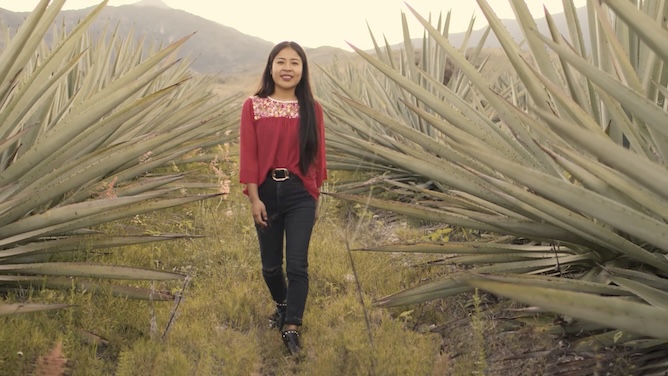According to NielsenIQ data obtained by the drinks industry publication SevenFifty Daily, the value of mezcal sales at liquor and grocery stores increased 143 percent between the start of 2020 and the start of 2023. At a 2023 value of $59.5 million compared to tequila’s $2.9 billion, mezcal is still a very small portion of the overall agave spirits market in the US. Still, the rapid growth means investors are watching closely. So too are those interested in traditional mezcal who want to make sure true expressions of the spirit are widely represented.
Zomoz is a newer mezcal to hit the market that’s Mexican owned and operated—increasingly an aspect of this traditional spirit that consumers will need to take note of as the celebrity tequila boom seeps into mezcal. The name is a play on the Spanish word somos, which translates to “we are.”
“I believe that tequila and mezcal will one day be what whiskey and bourbon are today,” says Diego De La Vega, one of the four founders behind Zomoz, all of whom are Mexican immigrants to the United States. “Mezcal for a more specific consumer, but with global recognition.”
Isabel Santiago leads Zomoz as maestra mezcalera. She’s a fourth generation mezcal producer, and one of the rare female leaders in the industry. Being around her father and grandfather as they worked got her interested in the family business at a young age. By 20, she was fully involved in mezcal production.

Credit: Zomoz
In a press release Q&A from 2023, Santiago said that being female in a male-dominated industry was less of a challenge thanks to her family’s support. Societal norms, however, were a different story.
“It has traditionally been believed that we women aren’t capable,” Santiago said. “But we women are capable, sometimes even more than men. The challenge has been with employees who aren’t used to working for or with a woman.”
Zomoz uses 100 percent USDA certified organic espadin agaves grown on Santiago’s family agave plantation and palenque in the Oaxacan town of Santiago Matatlán, just outside of Oaxaca City. It’s cooked underground in a conical stone oven that’s heated by wood fire. The cooked pinas are crushed using a stone tahona wheel and then fermented in open pine vats (tinas) before being distilled in copper pot stills and double filtered.
It’s a mezcal artisanal—a defined type allowed by mezcal’s governing body that doesn’t allow modern distillation techniques like column stills that strip out the natural agave flavors.
The fresh agave is clear from the nose to the first sip. It’s slightly citrusy, with a peppery note. The smokiness that so many associate with the spirit is gentle rather than in your face, and comes at the end along with sweet cooked agave flavor. The finish is clean and bright, though lingers just enough to be memorable.
We caught up with Santiago to learn more about her family history and the making of Zomoz.
This interview has been edited for length and clarity.
CM: Can you tell me more about being a woman in mezcal?
Isabel Santiago: My family, and the environment I grew up in, were not machista. With the education that I was given, it was my father who introduced me to this world, and encouraged me. In the past it would have been seen as improbable, or impossible, for me, as a woman, to be at the head of a company, much less become a maestra mezcalera.
Now, or at least what I see in my current environment, is a gradual reversal in that way of thinking, especially as we [women] become more educated.
In this industry, the production of mezcal has historically been seen as a task for men, because of the strength needed and the effort that goes into the process. But, little by little, we women have gained ground, demonstrating and proving that yes, we can, and that we are capable. However, when you look at the industry as a whole, there is still a greater presence of men in leadership roles.
How did your family history influence your approach to Zomoz?
I am part of the fourth generation of a mezcal-producing family, and the first mezcalera. I grew up playing among the agave plants. I watched my grandparents and parents transmit passion and love into their work. This passion and love is passed on, and is what makes ZOMOZ special.
The ZOMOZ operation is very natural and organic. Leaving as small a footprint as possible allows nature to do its job and our agave fields and surrounding land to thrive.
What's the value you see in preserving traditional techniques?
There are three categories: ancestral, artisanal, industrial. The large mezcal producers, who create products at high volumes in short periods of time, are considered industrial. Many of these are already well known.
Our primary objective is to produce a mezcal not only in terms of quantity, but of quality. And more importantly, doing it without losing the traditions and techniques that have been passed down through generations.
On the one hand is the knowledgeable consumer who already loves the category. On the other hand, we also want to attract the newcomer to mezcal, who may not know anything about the product. We want to introduce them to a mezcal that is smooth and delicious.
I grew up playing among the agave plants. I watched my grandparents and parents transmit passion and love into their work.
What is the value of things like cleaning the magueys by hand?
Cleaning the agaves by hand means that I know my agaves. In addition, we do not use agrochemicals and we take good care of the land. For example, chemicals are used in the production of many tequilas. This means that the soil becomes less fertile, thus creating the need for more chemicals to foster the growth of the agaves.
While cleaning the agaves by hand does not impact flavor, there is a tremendous benefit to our ecosystem.
What is the future of mezcal as US demand continues to grow?
Compared to other spirits, such as tequila, you can say that mezcal is in its infancy. My hope for mezcal is that consumers recognize the work and effort that goes into producing the spirit, and that it becomes a Mexican beverage recognized worldwide.
More Lifestyle

The Men’s Only Wellness Retreats You Won’t Find on Google
Once dismissed as woo-woo, men’s wellness retreats are becoming a legitimate answer to stress, isolation, and burnout.

The Most Hands-Off Way To Keep Your Floors Clean
CES 2026 can’t get enough of Roborock’s one-pass smart home cleaning solution.

The 5 Whiskeys You Pour When Dry January Is Officially Over
Splurge a little (or a lot) with a fine dram for your bar cart after a well-earned month off the sauce.


